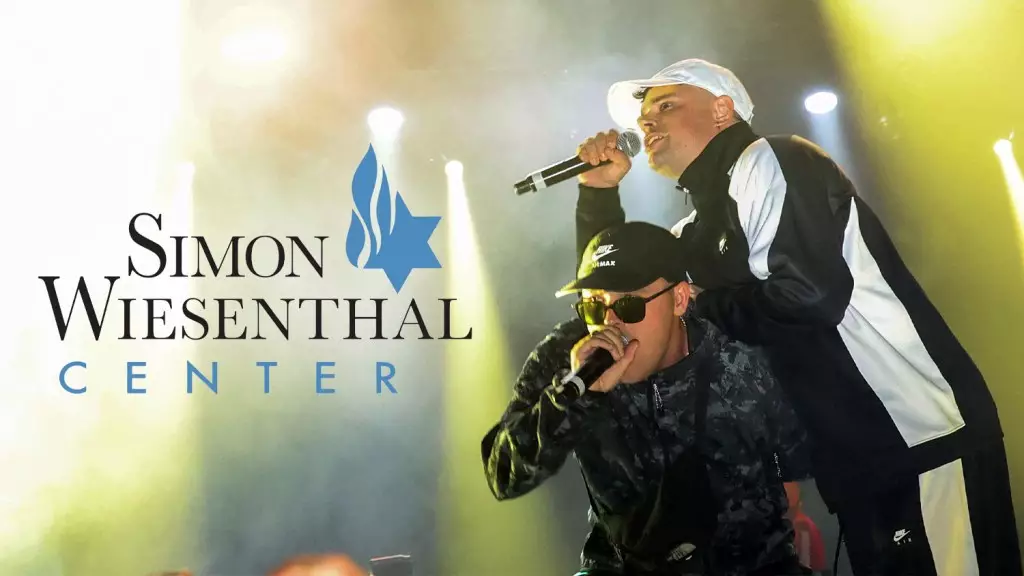The recent performance by the Irish hip-hop trio Kneecap at Coachella, marked by bold statements condemning Israel, has ignited a firestorm of controversy. While music festivals are often platforms for free expression, the juxtaposition of art and sensitive geopolitical issues can create a charged atmosphere, leading to varied interpretations. In this instance, Kneecap has called for a dialogue that dives deep into the complexities surrounding the Israeli-Palestinian conflict, yet the manner of their protest has raised eyebrows and prompted backlash from prominent organizations, such as the Simon Wiesenthal Center.
Kneecap’s incendiary remarks, including “F*ck Israel” and claims of genocide against Palestinians, were met with outrage from the Wiesenthal Center. The organization’s CEO, Jim Berk, emphasized the responsibility musicians have to foster empathy rather than hate. The Coachella incident sparked a broader conversation about whether festivals, which are designed for celebration and unity, are the appropriate backdrop for highlighting political dissent.
The Role of Festivals in Political Discourse
Music festivals like Coachella, which attract thousands of attendees, serve as a microcosm of society. They are melting pots of cultures, ideas, and beliefs. However, the responsibility of artists to navigate their messages with sensitivity cannot be understated. By using their platform to promote anti-Israel sentiments, Kneecap may have unwittingly deepened societal divides rather than fostering understanding. Berk’s assertion that music should bring people together rings true, especially in fragmented times.
The importance of the message conveyed during this performance cannot be dismissed, yet one must question the effectiveness of inflammatory rhetoric. Are better dialogues stifled by aggressive slogans? The war between Israeli and Palestinian forces has its roots in a historical narrative rarely captured in fleeting performances. Thus, the effectiveness of protest centered around simplistic slogans remains debatable.
Artistic Expression vs. Accountability
Balancing artistic expression with accountability is a nuanced endeavor. Kneecap’s inclination to confront power structures through music mirrors a historical tradition in artistic movements aimed at social change. However, when confrontational expressions are perceived as hateful, they risk alienating potential allies. The outcry from the Wiesenthal Center speaks to a broader concern surrounding the rise in antisemitism that has been witnessed in various contexts, including public gatherings and festivals.
Kneecap’s decision to subvert Coachella’s restrictions on their earlier criticisms certainly escalated the situation. Their insistence on displaying their views boldly indicates a commitment to their beliefs, yet this strategy neglects to consider the potential pain it inflicts on those who experienced violence or oppression in similar contexts. The weight of one’s words in art carries immense power—the challenge lies in wielding that power wisely.
Conversations vs. Condemnation
A healthy discourse following such incendiary performances is essential. Rather than resorting to blanket condemnation, a more productive approach would involve open discussions about how artists can effectively illuminate complex issues without resorting to divisive language. At the heart of controversy is an opportunity for growth—a chance to foster understanding across varying perspectives.
Dismissing Kneecap entirely negates the opportunity to engage with their message on a deeper level. While the aggressive rhetoric may prompt outrage, they have drawn attention to a pressing issue that requires ongoing dialogue. The Coachella platform, rather than being an end to the conversation, could serve as a catalyst for further discussion on the roots of conflict, the role of international powers, and the struggles faced by innocent people in these violent intersections of history.
Empathy in Art: A Call to Action
The essence of impactful artistic expression lies in its ability to evoke empathy. While dissent is a necessary component of a progressive society, it must be tempered with a sense of responsibility towards the communities being discussed. Music, inherently a unifying force, should transcend mere venting of frustrations to instead encourage conversation. As important as it is to voice grievances, finding constructive ways to channel these frustrations into peace and understanding remains paramount.
Kneecap’s stance has succeeded in shining a light on a contentious geopolitical issue. However, as voices in art continue to evolve, a conscious effort must be made to craft messages that transcend divisiveness and instead inspire collective healing and understanding. In the heart of controversy lies the potential for transformative dialogue—a realization that may yet redefine what it means to create music in a complex world.


Leave a Reply